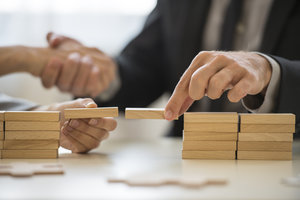Using Negotiations to Solve Education Challenges and Achieve the SDGs


Education Diplomacy uses the skills of diplomacy to build relationships across sectors and stakeholders to solve education challenges. In particular, negotiation skills can be applied to leverage agreement on those solutions – “Leverage” being the core component of the 5L Education Diplomacy Process (see below). These skills are also foundational for achieving the UN Sustainable Development Goals (SDGs), as Michele Ferenz, Senior Mediator of the Consensus Building Institute, explains. “Partnership and participation…are structured forms of negotiation [and] are a core part of the achievement of the SDGs.”
Negotiations were necessary to shape the vision for education known as the Incheon Declaration adopted at the 2015 World Education Forum and which has eventually been translated into Education SDG4. During the Forum, over 300 organizations with differing priorities for education were able to negotiate a Civil Society Declaration that influenced the final 2030 Framework for Action (FFA). The FFA is an Education Diplomacy roadmap that guides all actors working at country, regional, and global levels to work together toward SDG4.
Educators use negotiations daily at every level – from contributing to the development of school policies to high-level ministry officials agreeing upon cross-sector national education frameworks. You can read about how Ilham Nasser used negotiations to coordinate the development of an early childhood development (ECD) national framework for Palestine in the article, “Education Diplomacy and Negotiating an Early Childhood Education Framework for Palestine” in the May/June 2018 issue of Childhood Education: Innovations.
In her interview recorded for the online course “Negotiation Skills,” developed by the Center for Education Diplomacy and DiploFoundation, Michele Ferenz discusses the contexts for collaboration – between sectors and from global to local levels – in which educators may be involved to achieve SDG4 and the rest of the SDGs. She asserts that within these contexts, negotiations serve to influence by seeking to understand those parties involved. She emphasizes, “Good negotiators listen 70 percent of the time.” By building relationships in the negotiations process, it is possible to achieve mutually beneficial outcomes that meet the interests of everyone involved.
To learn more about the process of negotiation within the context of the SDGs, listen to ACEI’s Center for Education Diplomacy interview with Michele Ferenz. As Senior Mediator of the Consensus Building Institute, Michele has 20 years of expertise in mediation, peace building, and sustainable development with various organizations, including the United Nations and Oxfam.
Click on the video to hear Michele’s insights on negotiation skills and approaches, particularly within the context of the Sustainable Development Goals.